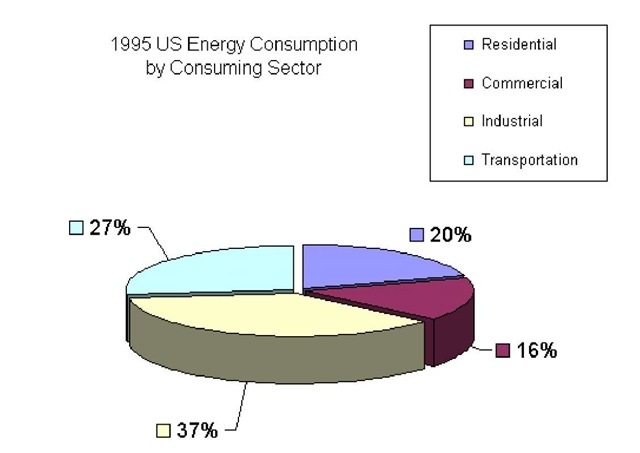How will potential lost power be compensated for?
• energy conservation?
• sale of hydro to the US by Canada?
• Coal-fired plants?
• wind?
• solar?
• nukes?
Total Energy Usage
Our total energy use can be divided into three principal areas each of which consume approximately equal amounts of energy on an annual basis:
• Electricity Generation
• Space Heating
• Transportation
This energy use has been roughly constant over the last 5 years and is dominated (90%) by the use of fossil fuels.
Fossil Fuels come in 3 principal forms from which many other products are derived:
• Coal
• Natural Gas
• Crude Oil
Most traditional Energy production comes about via steam driven turbines so the heating of water is what is essential.
• Coal Fired Steam Plants
• Nuclear Fired Steam Plants
• Oil/Natural Gas Fired Steam Plants
The Need for Alternative Energy
• Basic concept of alternative energy sources relates to issues of sustainability, renewability and pollution reduction.
• In reality, Alternative Energy means any thing other than deriving energy via Fossil Fuel combustion
• Basic Barrier to all forms of alternative energy lies in initial costs!
• Currently we have no significant production line alternative energy source operating anywhere in the US!
The simple problem is that there are simply not enough fossil fuels left to sustain its usage as the foundation of our energy production. Forget about global warming for the moment, the issue is more basic than that.
We have about 50 more years of production from known reserves , after that we will either have to discover more reserves are shift away from our fossil fuel based energy economy.
Forms of Alternative Energy:
• Solar:
Advantages: Always there; no pollution
Disadvantages: Low efficiency (5-15%); Very high initial costs; lack of adequate storage materials (batteries); High cost to the consumer
• Hydro:
Advantages: No pollution; Very high efficiency (80%); little waste heat; low cost per KWH; can adjust KWH output to peak loads; recreation dollars
Disadvantages: Fish are endangered species; Sediment buildup and dam failure; changes watershed characteristics; alters hydrological cycle
• Wind:
Advantages: none on large scale; supplemental power in windy areas; best alternative for individual homeowner
Disadvantages: Highly variable source; relatively low efficiency (30%); more power than is needed is produced when the wind blows; efficient energy storage is thus required
• Geothermal:
Advantages: very high efficiency; low initial costs since you already got steam
Disadvantages: non-renewable (more is taken out than can be put in by nature); highly local resource
• Ocean Thermal Energy Conversion:
Advantages: enormous energy flows; steady flow for decades; can be used on large scale; exploits natural temperature gradients in the ocean
Disadvantages: Enormous engineering effort; Extremely high cost; Damage to coastal environments?
• Tidal Energy:
Advantages: Steady source; energy extracted from the potential and kinetic energy of the earth-sun-moon system; can exploit bore tides for maximum efficiency
Disadvantages: low duty cycle due to intermittent tidal flow; huge modification of coastal environment; very high costs for low duty cycle source
• Hydrogen Burning:
Advantages: No waste products; very high energy density; good for space heating
Disadvantages: No naturally occurring sources of Hydrogen; needs to be separated from water via electrolysis which takes a lot of energy; Hydrogen needs to be liquefied for transport -takes more energy. Is there any net gain?
• Biomass Burning:
Advantages: Biomass waste (wood products, sewage, paper, etc) are natural by products of our society; reuse as an energy source would be good. Definite co-generation possibilities. Maybe practical for individual landowner.
Disadvantages: Particulate pollution from biomass burners; transport not possible due to moisture content; unclear if growing biomass just for burning use is energy efficient. Large scale facilities are likely impractical.
• Nuclear Fusion:Forget it, we aren’t smart enough yet.
But suppose we become smart enough in a few hundred years. Can adoption of sustainable energy technology get us to this point?

![tmp87-55_thumb[1] tmp87-55_thumb[1]](http://lh5.ggpht.com/_LenCZlyza20/TRK8_Pz60iI/AAAAAAAAGIQ/hCmBdinkBNk/tmp8755_thumb1_thumb2.jpg?imgmax=800)
![tmp87-56_thumb[1] tmp87-56_thumb[1]](http://lh5.ggpht.com/_LenCZlyza20/TRK9BcohjZI/AAAAAAAAGIY/ByHzJG9hQ-Q/tmp8756_thumb1_thumb2.jpg?imgmax=800)
![tmp87-57_thumb[1] tmp87-57_thumb[1]](http://lh3.ggpht.com/_LenCZlyza20/TRK9DyoV5TI/AAAAAAAAGIg/Vwb0OyHibHE/tmp8757_thumb1_thumb2.jpg?imgmax=800)
